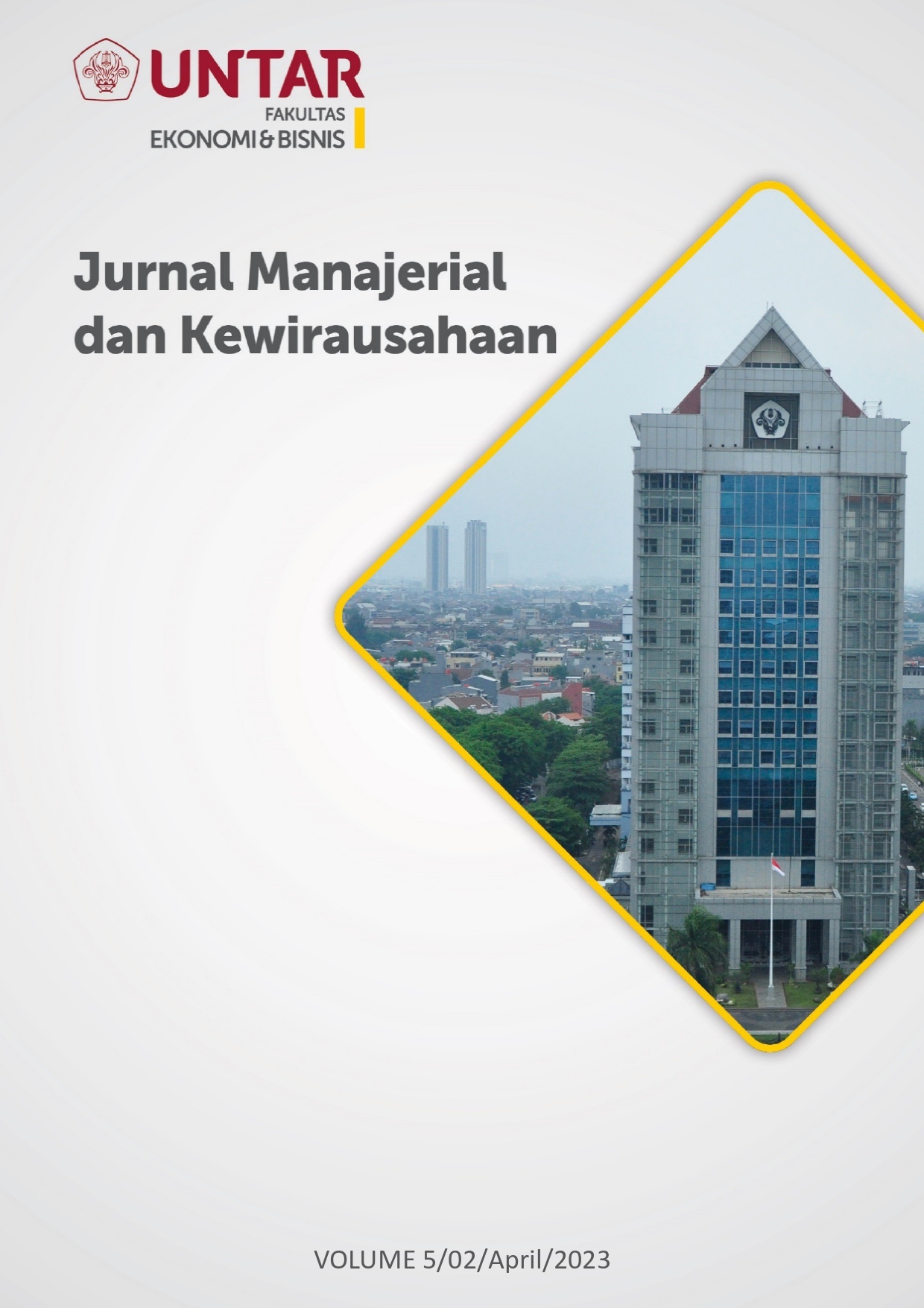Faktor yang Mempengaruhi Financial Behavior pada Pengguna E-Wallet di Jakarta Barat
Main Article Content
Abstract
Penelitian ini bertujuan untuk mengetahui pengaruh financial literacy, financial self-efficacy dan locus of control terhadap financial behavior. Desain penelitian ini menggunakan penelitian deskriptif kuantitatif, dengan data yang diperoleh dari kuesioner google form. Populasi dalam penelitian ini adalah pengguna e-wallet yang lahir tahun 1995-2010 atau disebut Generasi Z dan berdomisili di Jakarta Barat. Sampel yang digunakan dalam penelitian sebanyak 121 responden dengan metode non-probability. Teknik pemilihan sampel yang digunakan adalah purposive sampling. Penelitian ini menggunakan software SmartPLS versi 4.8.6, sebagai alat untuk menganalisis data. Hasil penelitian menunjukan bahwa financial literacy, financial self-efficacy dan locus of control berpengaruh positif dan signifikan terhadap financial behavior pengguna e-wallet Generasi z di Jakarta Barat.
This study aims to analyze the influence of financial literacy, financial self-efficacy, and locus of control. The research design uses quantitative descriptive research, with data obtained from the Google Form questionnaire. The population in this study are e-wallet users who were born in 1995-2010 or are called Generation Z and live in West Jakarta. The sample used in this study was 121 respondents using the non-probability method. The sample selection technique used was purposive sampling. This study uses SmartPLS software version 4.8.6, to operate and testify the data. The results of the study showed that financial literacy, financial self-efficacy and locus of control have a positive and significant effect on the financial behavior of Generation z e-wallet users in West Jakarta.
Article Details
Section

This work is licensed under a Creative Commons Attribution-NonCommercial-ShareAlike 4.0 International License.
This work is licensed under a Jurnal Muara Ilmu Ekonomi dan Bisnis Creative Commons Attribution-ShareAlike 4.0 International License.,/p>
References
Adiputra, I. G., Suprastha, N., & Tania, L. (2021). The Influence Of Financial Knowledge, Financial Attitude Dan Locus Of Control On Financial Behavior Of E-Wallet Users In Jakarta. Journal of Contemporary Issues in Business and Government, 27(1), 3318-3332.
Ajzen, I. (1991). The theory of planned behavior. Organizational Behavior and Human Decision, 50(2), 179-211.
Becker, L. A. (2000). Effect Size (ES). Retrieved from https://www.uv.es/~friasnav/EffectSizeBecker.pdf
Cherian, J., & Jacob, J. (2013). Impact of Self Efficacy on Motivation and Performance of Employees. International Journal of Business and Management, 8(14), 80-88.
Cocosila, M., & Trabelsi, H. (2016). An integrated value-risk investigation of contactless mobile payments adoption. In Electronic Commerce Research and Applications, volume 20. (pp. 159-170).
Forbes, J., & Kara, S. M. (2010, June). Confidence Mediates How Investment Knowledge Influences Investing Self-Efficacy. Journal of Economic Psychology, 31(3), 453-443.
Ghozali, I., & Latan, H. (2014). Partial Least Squares : Konsep, Teknik dan Aplikasi Menggunakan Program SmartPLS 3.0 (2 ed.). Semarang.
Hair, J. F., Ringle, C. M., & Sarstedt, M. (2011). PLS-SEM: Indeed a Silver Bullet. Journal of Marketing Theory and Practice, 19(2), 139-152.
Herawati, N. T., Candiasa, M., Yadnyana, K., & Suharsono, N. (2018, May). Factors That Influence Financial Behavior Among Accounting Students in Bali. International Journal of Business Administration, 9(3), 30-38.
Hiriyappa, B. (2009). Organizational Behavior. India: New Age International Private Limited.
Karim, M. W., Ulfy, A. M., & Haque, A. (2020). Factors Influencing the Use of E-wallet as a Payment Method Among Malaysian Young Adults. Journal of International Business and Management, 3(2).
Kholid, M. N. (2020). Understanding Students' Choice of Becoming Certified Sharia Accountant in Indonesia. The Journal of Asian Finance, Economics and Business, 7(10), 219-230.
Kholilah, N. A., & Iramani, R. (2013). Studi Financial Management Behavior Pada Masyarakat Surabaya. Journal of Business and Banking, 3(1), 69-80.
Kumala, I., & Mutia, I. (2020). Pemanfaatan Aplikasi Dompet Digital Terhadap Transaksi Retail Mahasiswa. Seminar Nasional Riset Dan Teknologi, 64-69.
Lusardi, A. (2012). Numeracy, Financial Literacy, and Financial Decision-Making. National Bureau of Economic Research, 2.
Mien, N. N., & Thao, T. P. (2015). Factors Affecting Personal Financial Management Behaviors: Evidence from Vietnam. Proceedings Of The Second Asia-Pacific Conference On Global Business, Economics, Finance And Social Sciences (Ap15vietnam Conference), 1-16.
Mindra, R., Moya, M., Zuze, L. T., & Kodongo, O. (2017). Financial self-efficacy: a determinant of financial inclusion. International Journal of Bank Marketing, 35(3), 338-353.
Nababan, D., & Sadalia, I. (2013). Analisis Personal Financial Literacy Dan Financial Behavior Mahasiswa Strata I Fakultas Ekonomi Universitas Sumatera Utara. Jurnal Media Informasi Manajemen, 1(1), 1-16.
Natan, E., & Mahastanti, L. A. (2022, Juli). Analisis pengaruh Financial Literacy dan Locus of Control sebagai variabel moderating terhadap Management Behaviour. Owner: Riset & Jurnal Akuntansi, 6(2), 2354-2363.
Noor, N., Batool, I., & Arshad, H. M. (2020). Financial Literacy, Financial Self-efficacy and Financial Account Ownership Behavior in Pakistan. Cogent Economics & Finance, 8(1), 1-17.
OJK. (2017). Pelaksanaan Kegiatan Dalam Rangka Meningkakan Literasi Keuangan di Sektor Jasa Keuangan. Retrieved from Ojk.go.id: https://www.ojk.go.id/id/kanal/edukasi-dan-perlindungan-konsumen/regulasi/surat-edaran-ojk/Documents//SAL SEOJK 30 - Literasi Keuangan.pdf
Putri, M. H. & Pamungkas, A. S. (2019). Pengaruh Financial Knowledge, Locus of Control dan Financial Self Efficacy Terhadap Financial Behavior. Jurnal Manajerial dan Kewirausahaan, 1(4), 890-889. https://doi.org/10.24912/jmk.v1i4.6591
Sarstedt, M., Hair, J. F., & Hopkins, L. (2014). Partial Least Square Structural Equation Modeling (PLS-SEM): An Emerging Tool in Business Research. European Business Review, 26(2), 106-121.
Sekaran, U., & Bougie, R. (2017). Metode Penelitian Untuk Bisnis (6 ed.). Salemba Empat.
Sugiyono. (2017). Metode Penelitian Kuantitatif, Kualitatif, dan R&D. Bandung: Alfabeta.
Vhalery, R., Leksono, A. W., & Irvan, M. (2019). Pengaruh Literasi Keuangan, Usia, dan Bimbingan Orang Tua terhadap Pengelolaan Uang Saku Mahasiswa UNINDRA. Jurnal Pendidikan Ekonomi, 12(1), 10-17.

